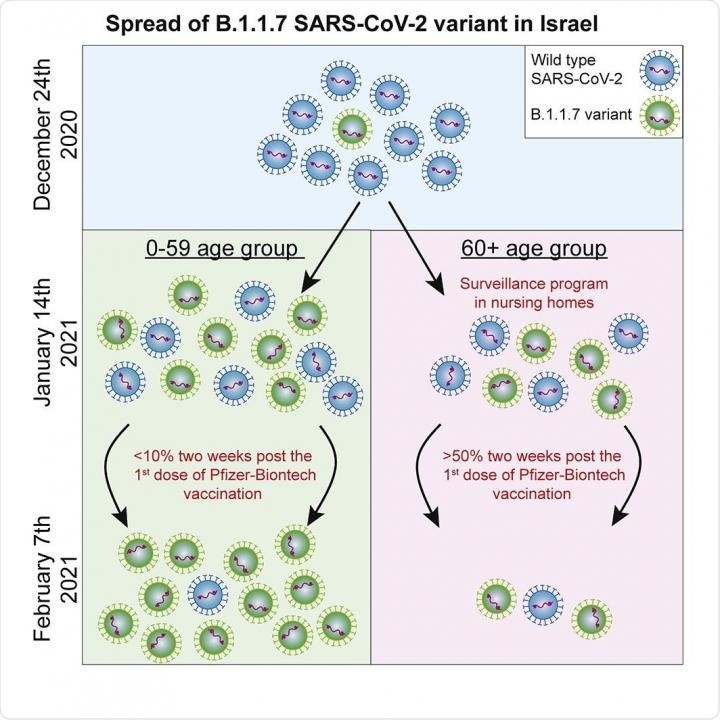The SARS-CoV-2 B.1.1.7 variant, also called the UK variant, was identified in London as well as in Southeast and East of England in December 2020. Since its emergence, the UK variant has undergone several mutations that have been said to have altered its infectivity and transmissibility in the community. The B.1.1.7 variant is defined by 17 mutations, several of which are located in the SARS-CoV-2 spike protein that mediates viral attachment and entry into human cells.
Studies show that mutation N501Y enhances binding affinity to angiotensin-converting enzyme 2 (ACE2) in the host cell. At the same time, the 69/70 deletion increased the infectivity of the B.1.1.7 variant in vitro in a pseudovirus model. The P681H mutation enhances furin cleavage, which affects infection and transmission. Despite all this data, there is no clarity about the increased transmissibility of the B.1.1.7 variant in real life outside the UK.
This is crucial because other variants such as the California variants B.1.526 and B.1.138 without the N501Y mutation have also been shown to be more transmissible. Estimates from preliminary evidence of studies in England show that B.1.1.7 is 43-82% more transmissible and thus contributes to an increase in the effective reproduction number by 1.4-1.8. However, it is not yet established if the B.1.1.7 is more infective than other variants and, if so, at what magnitude, especially outside England.
Moreover, it has also not been established if and how quickly the UK variant overtakes the non-N501Y SARS-CoV-2 variant in community settings. The answers to these questions will help determine necessary interventions to slow down the spread of the UK variant.

Analyzing the transmission dynamics of the UK variant using data from RT-PCR samples
Researchers from Israel recently assessed the impact of government-led interventions in Israel to fight the pandemic and explored the transmission dynamics of the UK variant. The Israeli government implemented 3 national programs in response to the pandemic. 1. Widespread RT-PCR testing, 2. targeted surveillance in nursing homes, and 3. prioritized vaccination with Pfizer-BioNtech BNT162b2 vaccine.
The researchers analyzed data from approximately 300,000 RT-PCR samples collected between December 6, 2020, and February 10, 2021. This data offers an ideal setting to examine the dynamics of the B.1.1.7 variant in the context of COVID-19 surveillance and vaccination programs. A pre-proof version of this study is published in the Cell Reports Medicine journal.
The analysis results showed that the B.1.1.7 is 45% more infectious than the wild-type strain of SARS-CoV-2 and became the dominant variant in Israel within 3.5 weeks. Despite the massive increase in viral transmission, focused RT-PCR testing and prioritized vaccination could prevent infection by the B.1.1.7 variant in the elderly population. Therefore, proactive surveillance along with prioritized vaccination can help reduce severe disease and subsequent death.
"Protection of populations that are susceptible to develop a severe disease due to SARS-CoV-2 infection is critical, especially given the emergence of variants such as B.1.1.7, which display increased transmission."
Findings show the significance of proactive surveillance and prioritized vaccination in decreasing transmission, severe disease, and mortality
The findings of this study demonstrate that active surveillance in nursing homes significantly reduced the transmission of the B.1.1.7 variant. The study also reports that Israel's prioritized vaccination program effectively prevented B.1.1.7-associated infections in the elderly. It also shows that the UK variant was 1.45 times more transmissible compared to the wild-type strain, which is in line with previous estimates that suggested a 1.56x increase in England.
"Our data are among the first to report real-world data of vaccination efficacy in a large community cohort."
The data from the study shows a clear containment of the UK variant in the 60+ age group using the Pfizer-Biontech vaccine. Moreover, a sharp decrease in cases was also observed two weeks post the first dose of vaccination in 50% of the elderly population. Overall, the study's findings suggest that proactive surveillance and prioritized vaccination are possible and can help contain transmission, severe disease, and subsequent mortality.
"Thus, pro-active protection programs such as routine surveillance and monitoring of populations at risk combined with prioritized vaccination are achievable and will reduce severe illness and subsequent death."
- BNT162b2 Vaccination Effectively Prevents the Rapid Rise of SARS-CoV-2 Variant B.1.1.7 in high risk populations in Israel (cell.com), https://linkinghub.elsevier.com/retrieve/pii/S266637912100080X
Posted in: Medical Research News | Disease/Infection News
Tags: ACE2, Angiotensin, Angiotensin-Converting Enzyme 2, binding affinity, Cell, CLARITY, Coronavirus Disease COVID-19, Efficacy, Enzyme, in vitro, Medicine, Mortality, Mutation, Nursing, Pandemic, Protein, Pseudovirus, Reproduction, SARS, SARS-CoV-2, Spike Protein, Vaccine

Written by
Susha Cheriyedath
Susha has a Bachelor of Science (B.Sc.) degree in Chemistry and Master of Science (M.Sc) degree in Biochemistry from the University of Calicut, India. She always had a keen interest in medical and health science. As part of her masters degree, she specialized in Biochemistry, with an emphasis on Microbiology, Physiology, Biotechnology, and Nutrition. In her spare time, she loves to cook up a storm in the kitchen with her super-messy baking experiments.
Source: Read Full Article
